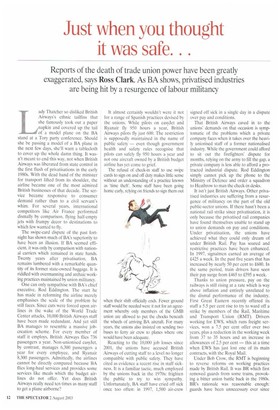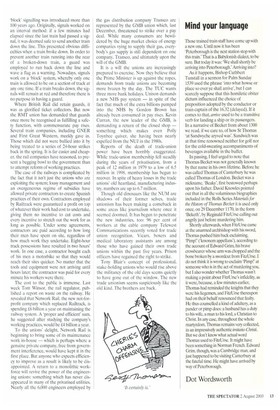Just when you thought it was safe. .
Reports of the death of trade union power have been greatly exaggerated, says Ross Clark. As BA shows, privatised industries are being hit by a resurgence of labour militancy Lady Thatcher so disliked British Airways's ethnic tailfins that she famously took out a paper napkin and covered up the tail of a model plane on the BA stand at a Tory party conference. Should she be passing a model of a BA plane in the next few days, she'll want a tablecloth to cover up the whole damn thing. It wasn't meant to end this way, not when British Airways was liberated from state control in the first flush of privatisations in the early 1980s. With the dead hand of the minister for transport lifted from its shoulder, the airline became one of the most admired British businesses of that decade. The service became responsive to consumer demand rather than to a civil servant's whim. For several years, international competitors like Air France performed dismally by comparison, flying half-empty jets with frumpy decor to destinations to which few wanted to fly.
The swipe-card dispute of the past fortnight has shown much of BA's superiority to have been an illusion. If BA seemed efficient, it was only by comparison with national carriers which remained in state hands. Twenty years after privatisation, BA remains lumbered with a remarkable quantity of its former state-owned baggage. It is riddled with overmanning and archaic working practices maintained by union militancy.
One can only sympathise with BA's chief executive, Rod Eddington. The start he has made in reforming the airline merely emphasises the scale of the problem he still faces. Since cuts were forced upon airlines in the wake of the World Trade Center attacks, 10,000 British Airways staff have been made redundant. And yet still BA manages to resemble a massive jobcreation scheme. For every member of staff it employs, British Airways flies 736 passengers a year. Non-unionised easyJet, by contrast, manages 6.300 passengers a year for every employee, and Ryanair 8,300 passengers. Admittedly, the airlines cannot be directly compared because BA flies long-haul services and provides some services like meals which the budget airlines do not offer. Yet does British Airways really need ten times as many staff to get a plane airborne? It almost certainly wouldn't were it not for a range of Spanish practices devised by the unions. While pilots on easyJet and Ryanair fly 950 hours a year, British Airways pilots fly just 600. The restriction is supposedly maintained in the name of public safety — even though government health and safety rules recognise that pilots can safely fly 950 hours a year and not one aircraft owned by a British budget airline has yet come to grief.
The refusal of check-in staff to use swipe cards to sign on and off duty makes little sense without an understanding of a practice known as 'time theft'. Some staff have been going home early, relying on friends to sign them out when their shift officially ends. Fewer ground staff would be needed were it not for an agreement whereby only members of the GMB union are allowed to put the chocks beneath the wheels of arriving BA aircraft. For many years, the unions also insisted on sending two buses to feny air crew to planes where one would have been adequate.
Reacting to the 10,000 job losses since 2001, the unions have accused British Airways of cutting staff to a level no longer compatible with public safety. They have cited as evidence a recent rise in staff sickness. It is a familiar tactic, much employed by the unions back in the 1970s: frighten the public to try to win sympathy, Unfortunately, BA staff have cried off sick once too often: in 1997, 1,500 air-crew signed off sick in a single day in a dispute over pay and conditions.
That British Airways caved in to the unions' demands on that occasion is symptomatic of the problems which a private company faces when it takes over the heavily unionised staff of a former nationalised industry. While the government could afford to sit out the firefighters' dispute for months, relying on the army to fill the gap, a private company is less able to afford a protracted industrial dispute. Rod Eddington simply cannot pick up the phone to the Ministry of Defence and order a squadron to Heathrow to man the check-in desks.
It isn't just British Airways. Other privatised industries are suffering from a resurgence of militancy on the part of the old public-sector unions. If there hasn't been a national rail strike since privatisation, it is only because the privatised rail companies have found themselves unable to stand up to union demands on pay and conditions. Under privatisation, the unions have achieved what they could only dream of under British Rail. Pay has soared and restrictive practices have been enhanced. In 1997, signalmen earned an average of £425 a week. In the past five years that has increased by nearly 50 per cent to £600. In the same period, train drivers have seen their pay surge from £465 to £595 a week.
Thanks to union pressure, pay on the railways is still rising at a rate which is way above inflation and entirely unrelated to the dismal performance of the industry. First Great Eastern recently offered its staff a 5.5 per cent rise to try to ward off a strike by members of the Rail, Maritime and Transport Union (RMT). Drivers working for EWS, which runs freight services, won a 7.5 per cent offer over two years, plus a reduction in the working week from 37 to 35 hours and an increase in allowances of 2.5 per cent — this at a time when EWS has just lost one of its main contracts, with the Royal Mail.
Under Bob Crow, the RMT is beginning to reverse reforms on working practices made by British Rail. It was BR which first removed guards from some trains, provoking a bitter union battle back in the 1980s. BR's rationale was reasonable enough: guards have been unnecessary ever since 'block' signalling was introduced more than 100 years ago. Originally, signals worked on an interval method: if a few minutes had elapsed since the last train had passed a signal, it was deemed safe to send another train down the line. This presented obvious difficulties when a train broke down. In order to prevent another train running into the rear of a broken-down train, a guard was employed to run back down the line and wave a flag as a warning. Nowadays, signals work on a 'block' system, whereby only one train is allowed to be on a section of track at any one time. If a train breaks down, the signals will remain at red and therefore there is no purpose in having a guard.
Where British Rail did retain guards, it was as glorified ticket collectors. But now the RMT union has demanded that guards once more be recognised as fulfilling a safety function, with commensurate pay rises. Several train companies, including GNER and First Great Western, meekly gave in. Those which did not were bullied into it by being treated to a series of 24-hour strikes back in the spring. It is far easier and cheaper, the rail companies have reasoned, to present a begging bowl to the government than to attempt reform of working practices.
The case of the railways is complicated by the fact that it isn't just the unions who are exploiting the system; lousy management and an overgenerous regime of subsidies have allowed private contractors to create Spanish practices of their own. Contractors employed by Railtrack were guaranteed a profit on top of whatever their work had cost to undertake, giving them no incentive to cut costs and every incentive to stretch out the work for as long as possible. Under some agreements, contractors are paid according to how long their men have spent on site, regardless of how much work they undertake. Eight-hour track possessions have resulted in two hours' work. In one case, a contractor bought each of his men a motorbike so that they would reach their sites quicker. No matter that the tools and equipment were not arriving until hours later; the contractor was paid for every minute his workers were there.
The cost to the public is immense. Last week Tom Winsor, the rail regulator, published a report on waste on the railway. He revealed that Network Rail, the new not-forprofit company which replaced Railtrack, is spending £6 billion a year on maintaining the railway system. A 'proper and efficient' sum, he suggested after studying the company's working practices, would be £4 billion a year.
To the unions' delight, Network Rail is beginning to bring some of its maintenance work in-house — which is perhaps where a genuine private company, free from government interference, would have kept it in the first place. But anyone who expects efficiency to improve as a result is likely to be disappointed. A return to a monolithic workforce will revive the power of the engineering unions: something which has never disappeared in many of the privatised utilities. Nearly all the 6,000 engineers employed by the gas distribution company Transco are represented by the GMB union which, last December, threatened to strike over a pay deal. While many consumers are bewildered by the huge market choice of energy companies vying to supply their gas, everybody's gas supply is still dependent on one company. Transco, and ultimately upon the will of the GMB.
It is a will the unions are increasingly prepared to exercise. Now they believe that the Prime Minister is up against the ropes, demands from trade unions are becoming more brazen by the day. The TUC wants three more bank holidays. Unison demands a new NHS pay system — in spite of the fact that much of the extra billions pumped into the NHS by Gordon Brown has already been consumed in pay rises. Kevin Curran, the new leader of the GMB, is demanding a return of the closed shop — something which makes even Polly Toynbee quiver, she having been nearly expelled from the NUJ in the 1980s.
Reports of the death of trade-union power have been horribly exaggerated. While trade-union membership fell steadily during the years of privatisation, from a peak of 12 million in 1979 to a low of 6.5 million in 1998, membership has begun to recover. In spite of heavy losses in the trade unions' old heartland, manufacturing industry, numbers are up to 6.7 million.
Though old dinosaurs like the NUM are shadows of their former selves, trade unionism has been making a comeback in some areas like journalism where once it seemed doomed. It has begun to penetrate the new industries, too: 96 per cent of workers at the cable company Telewest Communications recently voted for trade union recognition. Vicars, boxers and medical laboratory assistants are among those who have gained their own trade unions within the past five years. Prison officers have regained the right to strike.
Tony Blair's concept of professional, stake-holding unions who would rise above the militancy of the old days seems quietly to have gone out of the window. The new trade unionism seems suspiciously like the old kind. The brothers are back.



























































 Previous page
Previous page